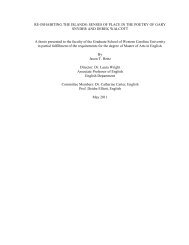SUMMERS, KAREN CRADY, Ph.D. Reading Incest - The University ...
SUMMERS, KAREN CRADY, Ph.D. Reading Incest - The University ...
SUMMERS, KAREN CRADY, Ph.D. Reading Incest - The University ...
You also want an ePaper? Increase the reach of your titles
YUMPU automatically turns print PDFs into web optimized ePapers that Google loves.
49<br />
for good rule. Book six relates the history of Nectanebus, who resorted to sorcery, as<br />
happened in the Tale of Mundus and Paulina, to trick the queen into believing that the<br />
god Amon wished to conceive a child by her. <strong>The</strong> result of this union is Alexander the<br />
Great, and the seventh book is dedicated Aristotle’s instruction of the young king.<br />
Amans should learn that education and accepting sound advice is a key component to a<br />
well-governed individual or king. Upon hearing this Amans vows to “eschuie” sorcerie<br />
(VI.2405) and follow the path of education and philosophy. Importantly for the<br />
following and final Book, book seven is concerned with<br />
the nature of fate, the proper use of knowledge, the linked questions of knowing<br />
oneself and knowing the nature of, and the duties owed, to God. . . .where the<br />
tales at the end of Book Six illustrate the consequences of a lack of understanding,<br />
Book Seven fills with what the characters in Book Six are missing. . . . Alexander<br />
had two teachers. <strong>The</strong> first, Nectanebus, is a model of wisdom gone wrong while<br />
the second, Aristotle, provides the wisdom that ‘doth gret profit’ (VI.6423). Book<br />
Seven has] the goal of grounding all ethical teaching, including that on ethics in<br />
love, in the purposes of the Creator. (Nicholson 335-6)<br />
By the end of book seven, the poet has established a pattern of moving from tales of least<br />
severity to highest with a remediating turn that allows for a hopeful ending; he has<br />
interrupted the pattern with tales of transformations, a history of the religions of the<br />
world, and a discourse on the education of a king. Amans is well prepared for the final<br />
part of his confession. <strong>The</strong> last of the seven deadly sins, lechery, is addressed in this final<br />
book. But as a priest of Venus, in whose court lechery is counted a virtue, Genius faces<br />
the difficulty of counseling Amans against it.<br />
Book eight performs multiple tasks. It concludes the task of Genius, sees the<br />
conciliation of Amans and his return to mental health, and concludes the poem with an
















